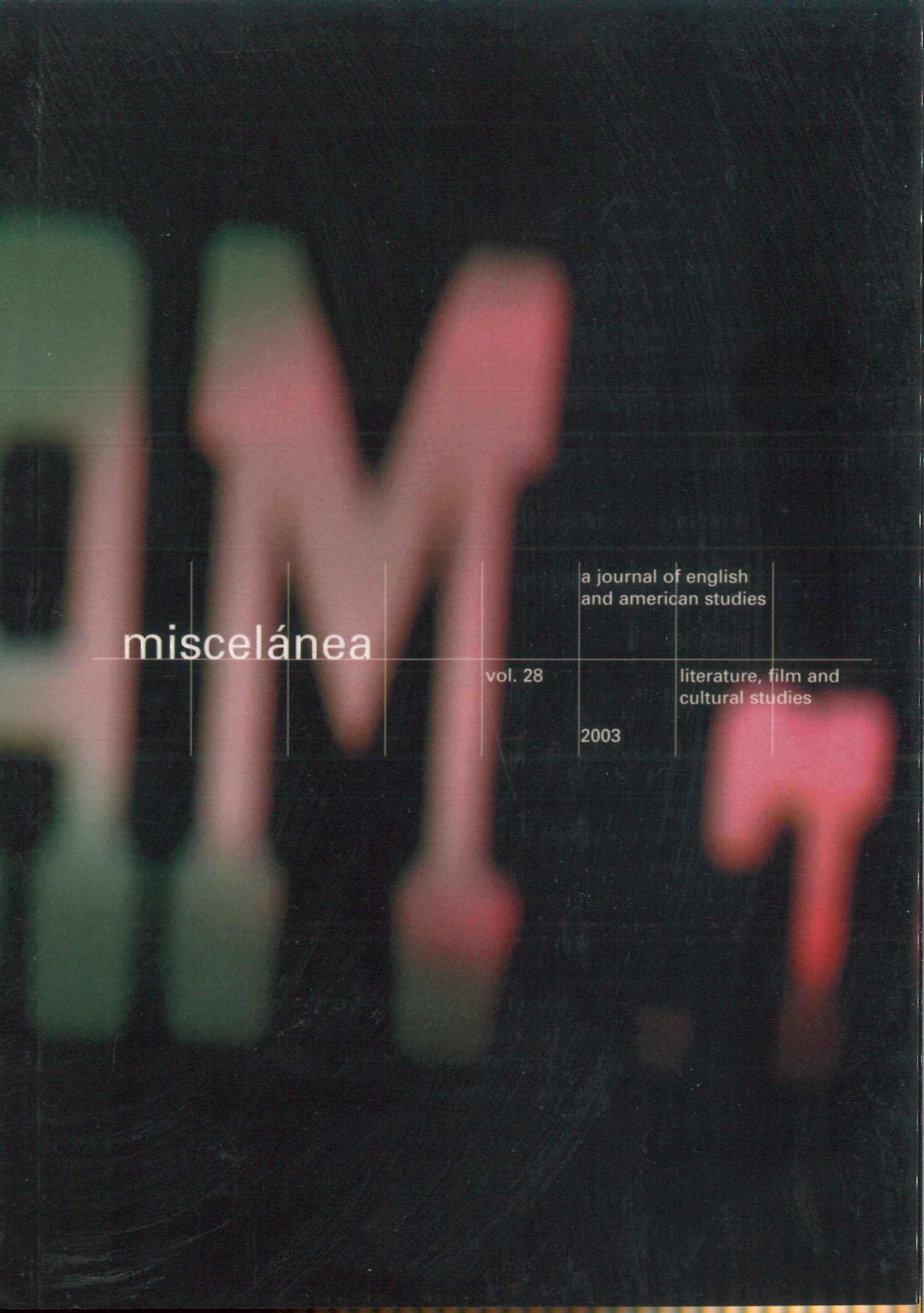Making Visible the Invisible: Reversing the Codes of Dominant Culture in Madonna's Videoclip Don't Tell Me
DOI:
https://doi.org/10.26754/ojs_misc/mj.200310216Palabras clave:
Madonna, Videoclip, Identidad, Género, Cultura americanaResumen
En 2001, Madonna sorprendió al público con una nueva imagen, la de la mezcla de música tecno con estética country en el videoclip Don,t Tell Me, de su álbum Music. En muchos de sus clips anteriores, Madonna prestó atención a grupos marginales, llevándolos al centro. Basando mi análisis en las teorías de Laura Mulvey, Richard Dyer y Stuart Hall, entre otros, intentaré demostrar que, en el videoclip Don,t Tell Me, Madonna toma la figura mítica del vaquero como manifestación cultural del grupo dominante y lo relega a la condición de "el otro", al tiempo que propone un mundo de libertad en el que ya no existen jerarquías culturales basadas en cuestiones de género y raza.
Descargas
Referencias
BERG, Chuck. 2000. "Fade-Out in the West: The Western's Last Land?". In Dixon, Wheeler Winston. (ed.). Film Genre 2000. New Critical Essays. New York: State University of New York Press: 211-226.
BOUINEAU, Jean-Marc, Alain CHARLOT and Jean Pierre FRIMBOIS. 1989. Les 100 chefs-d'oeuvre du Western. Alleur (Belgique): Marabout.
CALVO PASCUAL, Monica. 2000. "Express Yourself: A Postmodernist Gaze on Power and Femininity". In Coperias, Maria Jose. (ed.). Culture and Power: Challenging Discourses. Valencia: Universidad de Valencia.
CHIARINI, Paolo. 1969 (1967). Benoit Brecht. Trans. Jesus Lopez Pacheco. Barcelona: Ediciones Peninsula.
CHOW, Rey. 1998. "Film and Cultural Identity". In Gibson, Pamela Church and John Hill. (eds.).: 169-174.
COOK, Pam and Mieke BERNINK. 1999 (1985). The Cinema Book. London: British Film Institute.
CORNUT-GENTILLE, Chantal and Felicity HAND. (eds.). 1995. "What do we mean by Culture? Overview of main concepts and ideas". In Culture and Power. Barcelona: Universitat Autonoma de Barcelona: 1-17.
CREED, Barbara. 1998. "Film and Psychoanalysis". In Gibson, P. c. and J. Hill. (eds.).: 77-90.
DYER, Richard. 1993. "White". In The Matter of Images: Essays on Representations. London: Routledge.
FOLSOM, James K. (ed.). 1979. The Western: A Collection of Critical Essays. Englewood Cliffs (N.J): Prentice-Hall Inc.
GIBSON, Pamela Church and John HILL. (eds.). 1998. The Oxford Guide to Film Studies. Oxford: Oxford U. P.
HALL, Stuart. 1990. "Who Needs Identity?". In Hall, Stuart and Paul du Gay. (eds.). Questions of Cultural Identity. London: Sage: 1-18.
HILL, John. 1998. "Film and Postmodernism". In Gibson, Pamela Church and John Hill. (eds.).: 96-105.
JAMES, Caryn. 1990. "Beneath All That Black Lace Beats the Heart of a Bimbo ... ". The New York Times. Sunday, December 16, 1990: 38-44.
KAPLAN, E. Ann. 1993. "Madonna Politics: Perversion, Repression or Subversion? Or Masks and/as Master-y". In Schwitenberg, Cathy. (ed.).: 149-166.
MANDZIUK, Roseann M. 1993. "Feminist Politics and Postmodern Seductions: Madonna and the Struggle for Political Articulation". In Schwitenberg, C. (ed.).: 167-187.
MORTON, Melanie. 1993. "Don't Go for Second Sex Baby!". In Schwitenberg, C. (ed.).: 213-235.
MULVEY, Laura. 1989 (1975). "Visual Pleasure and Narrative Cinema". In Visual and Other Pleasures. London: Macmillan: 14-28.
NAKAYAMA, Thomas K and Lisa N. PENALOZA. 1993; "MT/Races: Music Videos Through the Prism of Color". In Schwitenberg, C. (ed.).: 143-164.
PRIBRAM, E. Deidre. 1993. "Seduction, Control, and the Search for Authenticity: Madonna's Truth or Dare". In Schwitenberg, C. (ed.).: 189-212.
RODRIGUEZ, Rafa. El Periódico. Madrid, June 2001: 3-6.
SEIGWORTH, Greg. 1993. "The Distance Between Me and You: Madonna and Celestial Navigation (or You Can Be My Lucky Star)". In Schwitenberg, C. (ed.).: 291-318.
SCHWITENBERG, Claire. (ed.). 1993. The Madonna Connection. Representational Politics, Subcultural Identities and Cultural Theory. Boulder: Westview Press.
SCHWITENBERG, Claire. 1993. "Introduction: Connections/Intersections". In Schwitenberg, C. (ed.).: 1-11.
SHOWALTER, Elaine. 1988 (1977 ). A Literature of Their Own: British Women Novelists from Bronte to Lessing. London: Virago.
SISCHY, Ingrid. Interview Magazine, March 2001. Trans. El Semanal, Heraldo de Aragon, nº 708 (May 2001 ): 24-36.
WATTS, Mark. 1996. "Electrifying Fragments: Madonna and Postmodern Performance". In NTQ, nº 46 (vol. 12. May 1996): 99-109.
WHITE, Patricia. 1998. "Feminism and Film". In Gibson P. C. and J. Hill. (eds.).:·117-134.
Descargas
Publicado
Número
Sección
Licencia

Esta obra está bajo una licencia internacional Creative Commons Atribución-NoComercial 4.0.


